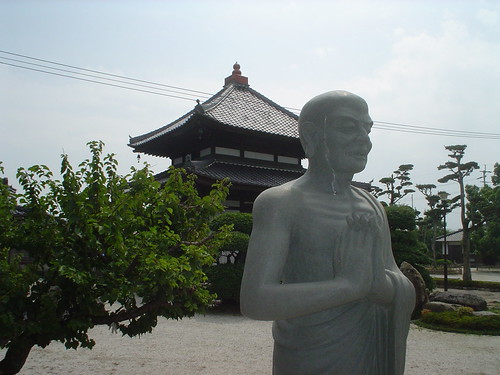Field work in Kumamoto
Lately I've been gathering information on the Jodo shinshu sect 浄土真宗, or Pure Land Buddhism, in Kumamoto for a paper I'm working on. Kumamoto has a rich history of Pure Land Buddhism, presently holding 470 temples throughout the prefecture (compared to a handful of Zen temples).
Like other Japanese Buddhist sects during the Pacific war period, Jodo shinshu was a strong advocator of the war. Some of this war-time support can be attributed to its subordinate position to Shinto, the state religion at the time. Looking back a bit farther in history, Buddhist priests across the country were persecuted and temples levelled at the beginning of the Meiji era (late 1860's) in a wave of anti-Buddhist sentiment. Then in 1911 amidst escalating nationalism, a number of Buddhist priests who were outspoken war critics were given executions and life sentences by the government. The official position was clear: go against the war and serious consequences will follow.
In that atmosphere, Jodo Shinshu became a major proponent of the war campaign, going as far as deleting suspect lines from their founder's writings (Shinran, twelth century). Much of this information has been exposed through historical research in the last fifteen years (see Brian Victoria, Zen at War). My present interest is to look back into local responses to the war among the temples of Kumamoto at the time. While the institutional stance of Jodo shinshu was transparent throughout the war period, I've begun finding through interviews at temples that local reaction was more ambiguous.
Like other Japanese Buddhist sects during the Pacific war period, Jodo shinshu was a strong advocator of the war. Some of this war-time support can be attributed to its subordinate position to Shinto, the state religion at the time. Looking back a bit farther in history, Buddhist priests across the country were persecuted and temples levelled at the beginning of the Meiji era (late 1860's) in a wave of anti-Buddhist sentiment. Then in 1911 amidst escalating nationalism, a number of Buddhist priests who were outspoken war critics were given executions and life sentences by the government. The official position was clear: go against the war and serious consequences will follow.
In that atmosphere, Jodo Shinshu became a major proponent of the war campaign, going as far as deleting suspect lines from their founder's writings (Shinran, twelth century). Much of this information has been exposed through historical research in the last fifteen years (see Brian Victoria, Zen at War). My present interest is to look back into local responses to the war among the temples of Kumamoto at the time. While the institutional stance of Jodo shinshu was transparent throughout the war period, I've begun finding through interviews at temples that local reaction was more ambiguous.


